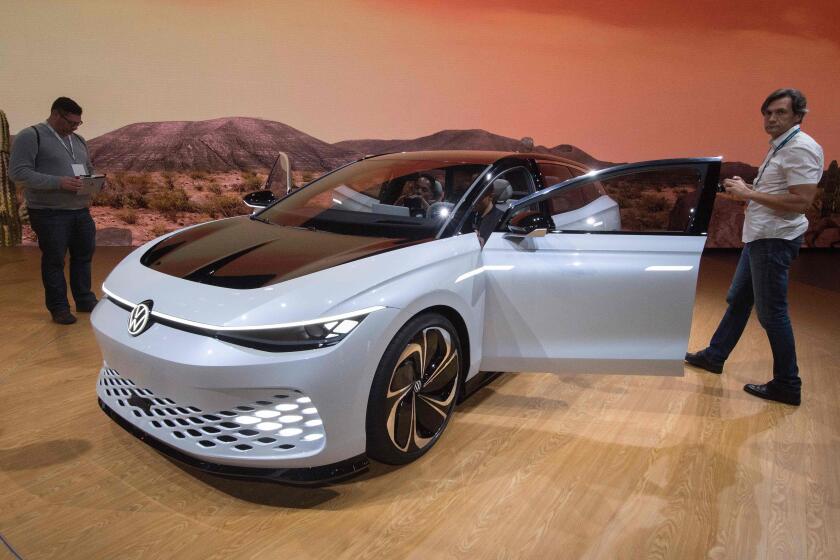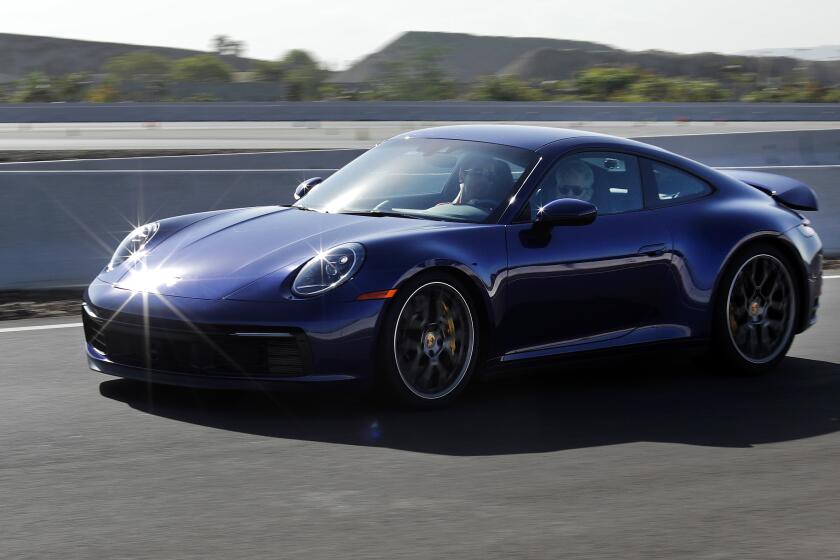Lexus confronts a midlife crisis with aging SUVs that are losing to rivals
- Share via
Big red bows and the “December to Remember” tagline of year-end Lexus ads have become as much a part of the holiday season as lawn ornaments and tacky sweaters. But the upscale brand had less to celebrate last year in the U.S., with sales flat and few new vehicles to showcase.
Thirty years after its debut shocked established German automakers, demand for Toyota Motor Corp.’s luxury brand has stalled, with sales on track to trail BMW AG and Daimler AG’s Mercedes-Benz. Once the unquestioned leader of the pack, it hasn’t taken the top slot in the U.S. since 2010. Its market share of 13% is down from a peak of 18.2% a decade ago, according to car-shopping researcher Edmunds.
A growing number of carmakers will arrive at the L.A. Auto Show with battery powered or plug-in hybrid SUVS and crossover utility vehicles.
Lexus’s 30th anniversary brake-tap is a reflection of its aging vehicle lineup, increased competition and an inability to keep pace with American buyers’ growing demand for larger sport utility vehicles. Two of its SUVs haven’t undergone a full model change in a decade, and the addition of a cramped three-row option to its popular RX model in late 2017 hasn’t won over as many cross-shoppers as hoped.
“Lexus has lost some of its luster,” said Jake Fisher, senior director of auto testing at Consumer Reports, who points to gains by rivals such as Hyundai Motors Co.’s Genesis brand. “Genesis is taking that baton. They are what Lexus used to be: affordable, comfy and stress-free.”
Toyota executives and dealers say the pause will be temporary ahead of a product blitz over the next two years. Noting that Lexus sales are “about flat” this year, Bob Carter, Toyota’s top sales executive in North America, told reporters recently that a refreshed version of Lexus’ top-selling RX is on its way as a prelude to more vehicles headed for U.S. showrooms.
“A lot of new product is coming this way for Lexus down the road,” he said.
Peer-to-peer car sharing seems strange but turns out to be easy, if a bit expensive.
Lexus pioneered the luxury SUV when the RX debuted in 1998, but it hasn’t kept up with growth in the increasingly crowded segment. The mid-size GX and larger LX ride on antiquated chassis with dated interiors and infotainment displays. Both vehicles also have subpar fuel economy and limited cargo room compared with rival vehicles such as the Audi Q7, BMW X7, Mercedes GLS and Volvo XC90.
“We know 2019 was a year that we missed it,” Paul LaRochelle, general manager of a Lexus franchise in Annapolis, Md., and chair of the brand’s dealer council, said in an interview. “We will see Lexus making significant gains in the market over the next two, three, four, five years and beyond.”
Lexus’ plans include long-awaited updates to existing SUVs and at least one all-new mid-size SUV, he said. “The best way to put it would be a luxury seven- or eight-passenger people-mover.”
Jason Shelton, a 42-year-old general manager at a telecom company, wants to upgrade his RX to a larger vehicle but says the outdated styling of Lexus SUVs is a turnoff. “Frankly, we’re hoping it is updated by the time the lease is up next year so we can get the bigger vehicle. Otherwise we will probably move to a different company,” the Nashville-area resident said.
By some measures, Lexus remains the brand to beat. Three of its vehicles rank among the top 10 most reliable models in an annual Consumer Reports survey (the Toyota brand has three more), and J.D. Power named it the top brand for resale value. Lexus sold its 10 millionth vehicle last year, a testament to its success over other Japanese luxury brands like Nissan Motor Co.’s Infiniti and Honda Motor Co.’s Acura, whose cumulative worldwide sales total 2.6 million and 5.4 million, respectively.
Porsche’s eighth-generation 911 is stylistically familiar, but performance is impressively new.
Once mostly geared for the U.S., Lexus has increasingly become a global brand with rapid growth in China and Europe, where small crossovers dominate sales. Its most recent vehicle premieres took place in those two markets, including the UX compact crossover in 2018 in Geneva and an electric-powered variant — the brand’s first EV — in Guangzhou in November. That has raised questions among some dealers and brand watchers about whether the U.S. now takes a back seat to other markets when it comes to investment priorities and vehicle development.
“It’s definitely been a slow time for the brand, and that’s what happens when you don’t have product to talk about,” said Kevin Watts, editor of the influential fan blog Lexus Enthusiast.
Lexus officials say the U.S. market has not been forgotten by executives in Toyota City. “Behind the curtain right now, what’s going on is that everything — all the attention — in Japan is to get Lexus back in the game with a tremendous lineup over the next few years,” said LaRochelle of the dealers’ council.
Those assurances from top Toyota officials came during an October meeting in Washington, where dealers said the vehicle highest on their wish list is an 18-foot SUV akin to General Motors Co.’s GMC Yukon Denali XL. “That is one of our primary asks and one that they’re looking at,” LaRochelle said.
More to Read
Inside the business of entertainment
The Wide Shot brings you news, analysis and insights on everything from streaming wars to production — and what it all means for the future.
You may occasionally receive promotional content from the Los Angeles Times.










